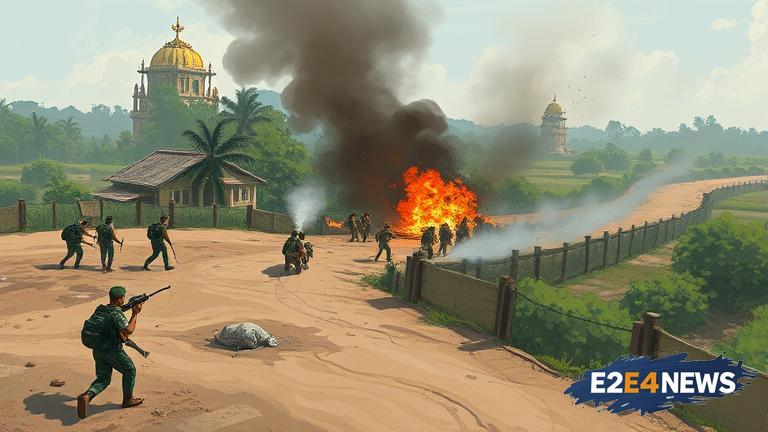The ongoing conflict between Thailand and Cambodia has taken a devastating turn, with the death toll continuing to rise and thousands of civilians fleeing the border regions. The clashes between the two nations have been ongoing for several weeks, with both sides exchanging artillery fire and blaming each other for the violence. The conflict has resulted in the displacement of over 168,000 civilians, who have been forced to flee their homes and seek shelter in safer areas. The situation on the ground is dire, with reports of homes and buildings being destroyed, and civilians being caught in the crossfire. The Thai military has been accused of using excessive force, while the Cambodian government has claimed that Thailand is attempting to annex its territory. The international community has called for calm and restraint, with the United Nations urging both sides to engage in dialogue and find a peaceful resolution to the conflict. Despite the efforts of diplomats, the situation remains volatile, with both sides refusing to back down. The conflict has also had a significant impact on the local economy, with trade and tourism being severely affected. The Thai government has imposed a curfew in the affected areas, and the military has been deployed to maintain order. The Cambodian government has also taken measures to protect its citizens, with the military being deployed to the border regions. The conflict has sparked widespread condemnation, with human rights groups calling for an investigation into the violence. The European Union has expressed concern over the situation, and has called for a peaceful resolution to the conflict. The United States has also weighed in, with the State Department urging both sides to engage in dialogue and find a peaceful solution. The conflict has also had a significant impact on the region, with neighboring countries expressing concern over the situation. The Association of Southeast Asian Nations (ASEAN) has called for calm and restraint, and has urged both sides to engage in dialogue. The situation remains uncertain, with the potential for further escalation. The international community is watching the situation closely, and is urging both sides to find a peaceful resolution to the conflict. The conflict has also raised concerns over the treatment of civilians, with reports of human rights abuses and the use of force against non-combatants. The Thai and Cambodian governments have both denied any wrongdoing, but the international community remains skeptical. The situation on the ground is complex, with multiple factions and interests at play. The conflict has also had a significant impact on the environment, with reports of damage to protected areas and the destruction of natural habitats. The long-term consequences of the conflict are still unknown, but it is clear that the situation will have a lasting impact on the region. The international community must continue to pressure both sides to engage in dialogue and find a peaceful resolution to the conflict. The use of force and violence must be condemned, and those responsible must be held accountable. The situation in Thailand and Cambodia is a reminder of the importance of diplomacy and dialogue in resolving conflicts peacefully.





